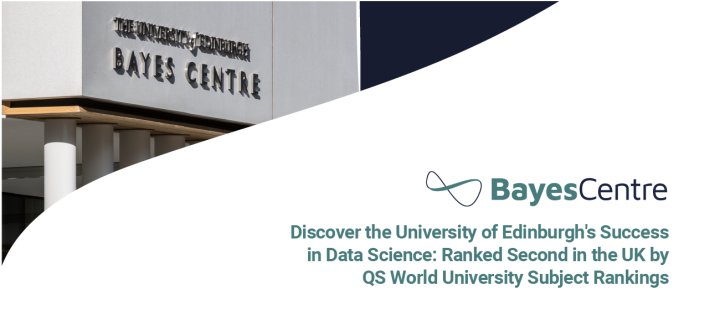[30/03/23] Discover the University of Edinburgh's Success in Data Science: Ranked Second in the UK by QS World University Subject Rankings
The University of Edinburgh's recent achievements in data science have placed it among the top 15 universities globally and second in the UK, according to the QS World University Subject Rankings.

The University of Edinburgh's recent achievements in data science have placed it among the top 15 universities globally and second in the UK, according to the QS World University Subject Rankings. This recognition is a testament to the institution's commitment to providing excellent education and research opportunities in the field of data science.
The QS World University Rankings are considered one of the most prestigious, comprehensive, and well-regarded university rankings globally. They evaluate institutions based on several factors, including academic reputation, research impact, and employer reputation. In the 2023 rankings, 1,594 institutions featured across 54 specific subjects, which are classified into five overarching subject areas. Students, researchers, and employers worldwide widely use the rankings to assess the quality of higher education institutions.
The University of Edinburgh's data science ranking success is a testament to its commitment to providing excellent education and research opportunities. The institution's research facilities and world-class faculty members play a crucial role in the university's research output. The Bayes Centre, the University of Edinburgh's Innovation Hub for Data Science and Artificial Intelligence, is proud to house a community of internationally recognised scientists and outstanding PhD students who have the opportunity to work alongside leading industry experts.
Another key reason for success in the QS World University Rankings, alongside world-leading research, is that the University of Edinburgh has developed an impressive teaching program in data science. The university's programmes are designed to provide students with a strong foundation in data science, covering topics such as statistics, machine learning, data analytics, and data visualisation. To find out more about postgraduate data science opportunities offered through the Bayes Centre, please have a look at our Data Science, Technology and Innovation programme.
In addition to research and teaching, the University of Edinburgh has established strong industry connections in the field of data science and AI. Through the Bayes Centre, the university has built partnerships with a range of companies and continually supports emerging enterprises, allowing knowledge to flow between academia and industry. This collaborative, multidisciplinary environment provides a proving ground where innovative technological solutions can be developed and researched. Moreover, the programmes offered by the Bayes Centre for academic staff in pursuit of research commercialisation have seen tremendous success as translational goals are achieved.
The Bayes Centre is pleased to see that the University of Edinburgh's success in data science has not gone unnoticed, as the institution continues to receive recognition for its contributions to the field. The university's faculty, comprising researchers from several disciplines, including computer science, cognitive science, artificial intelligence, and computational linguistics, among others, regularly receive prestigious awards for their research. The University continues to innovate in the field of data science, demonstrated through the work of the Bayes Centre, which has created unique opportunities for academics to collaborate on exciting projects outside of their typical remit.
The University of Edinburgh's recent QS World University ranking success in data science is indicative of its commitment to providing excellent research and teaching opportunities in this field. Edinburgh's strong industry connections and multidisciplinary approach to research and teaching make it a leading institution for students, researchers, and industry professionals interested in data science and artificial intelligence.

